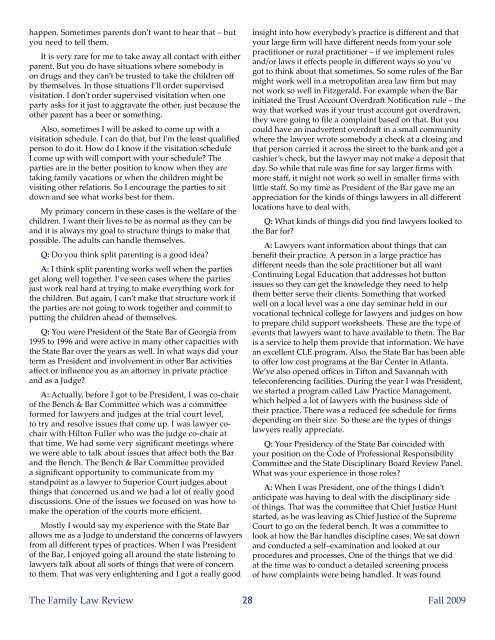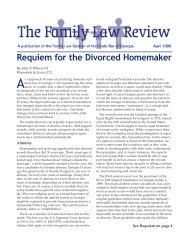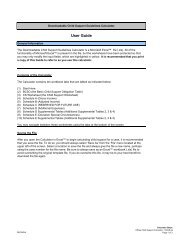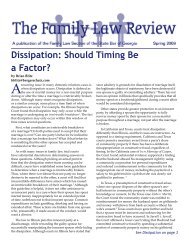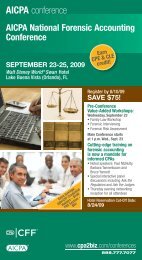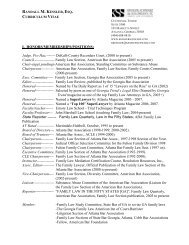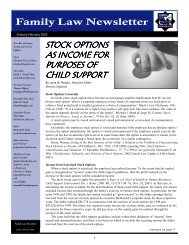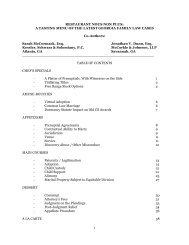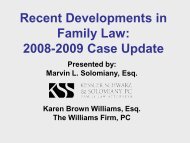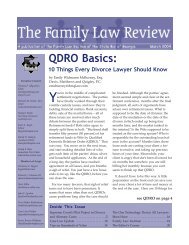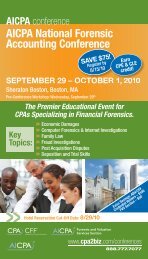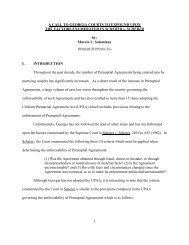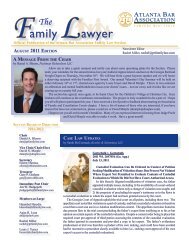Fall 2009 - Atlanta - Divorce Lawyer - Family Law - Atlanta Georgia
Fall 2009 - Atlanta - Divorce Lawyer - Family Law - Atlanta Georgia
Fall 2009 - Atlanta - Divorce Lawyer - Family Law - Atlanta Georgia
You also want an ePaper? Increase the reach of your titles
YUMPU automatically turns print PDFs into web optimized ePapers that Google loves.
happen. Sometimes parents don’t want to hear that – butyou need to tell them.It is very rare for me to take away all contact with eitherparent. But you do have situations where somebody ison drugs and they can’t be trusted to take the children offby themselves. In those situations I’ll order supervisedvisitation. I don’t order supervised visitation when oneparty asks for it just to aggravate the other, just because theother parent has a beer or something.Also, sometimes I will be asked to come up with avisitation schedule. I can do that, but I’m the least qualifiedperson to do it. How do I know if the visitation scheduleI come up with will comport with your schedule? Theparties are in the better position to know when they aretaking family vacations or when the children might bevisiting other relations. So I encourage the parties to sitdown and see what works best for them.My primary concern in these cases is the welfare of thechildren. I want their lives to be as normal as they can beand it is always my goal to structure things to make thatpossible. The adults can handle themselves.Q: Do you think split parenting is a good idea?A: I think split parenting works well when the partiesget along well together. I’ve seen cases where the partiesjust work real hard at trying to make everything work forthe children. But again, I can’t make that structure work ifthe parties are not going to work together and commit toputting the children ahead of themselves.Q: You were President of the State Bar of <strong>Georgia</strong> from1995 to 1996 and were active in many other capacities withthe State Bar over the years as well. In what ways did yourterm as President and involvement in other Bar activitiesaffect or influence you as an attorney in private practiceand as a Judge?A: Actually, before I got to be President, I was co-chairof the Bench & Bar Committee which was a committeeformed for lawyers and judges at the trial court level,to try and resolve issues that come up. I was lawyer cochairwith Hilton Fuller who was the judge co-chair atthat time. We had some very significant meetings wherewe were able to talk about issues that affect both the Barand the Bench. The Bench & Bar Committee provideda significant opportunity to communicate from mystandpoint as a lawyer to Superior Court judges aboutthings that concerned us and we had a lot of really gooddiscussions. One of the issues we focused on was how tomake the operation of the courts more efficient.Mostly I would say my experience with the State Barallows me as a Judge to understand the concerns of lawyersfrom all different types of practices. When I was Presidentof the Bar, I enjoyed going all around the state listening tolawyers talk about all sorts of things that were of concernto them. That was very enlightening and I got a really goodinsight into how everybody’s practice is different and thatyour large firm will have different needs from your solepractitioner or rural practitioner – if we implement rulesand/or laws it effects people in different ways so you’vegot to think about that sometimes. So some rules of the Barmight work well in a metropolitan area law firm but maynot work so well in Fitzgerald. For example when the Barinitiated the Trust Account Overdraft Notification rule – theway that worked was if your trust account got overdrawn,they were going to file a complaint based on that. But youcould have an inadvertent overdraft in a small communitywhere the lawyer wrote somebody a check at a closing andthat person carried it across the street to the bank and got acashier’s check, but the lawyer may not make a deposit thatday. So while that rule was fine for say larger firms withmore staff, it might not work so well in smaller firms withlittle staff. So my time as President of the Bar gave me anappreciation for the kinds of things lawyers in all differentlocations have to deal with.Q: What kinds of things did you find lawyers looked tothe Bar for?A: <strong><strong>Law</strong>yer</strong>s want information about things that canbenefit their practice. A person in a large practice hasdifferent needs than the sole practitioner but all wantContinuing Legal Education that addresses hot buttonissues so they can get the knowledge they need to helpthem better serve their clients. Something that workedwell on a local level was a one day seminar held in ourvocational technical college for lawyers and judges on howto prepare child support worksheets. These are the type ofevents that lawyers want to have available to them. The Baris a service to help them provide that information. We havean excellent CLE program. Also, the State Bar has been ableto offer low cost programs at the Bar Center in <strong>Atlanta</strong>.We’ve also opened offices in Tifton and Savannah withteleconferencing facilities. During the year I was President,we started a program called <strong>Law</strong> Practice Management,which helped a lot of lawyers with the business side oftheir practice. There was a reduced fee schedule for firmsdepending on their size. So these are the types of thingslawyers really appreciate.Q: Your Presidency of the State Bar coincided withyour position on the Code of Professional ResponsibilityCommittee and the State Disciplinary Board Review Panel.What was your experience in those roles?A: When I was President, one of the things I didn’tanticipate was having to deal with the disciplinary sideof things. That was the committee that Chief Justice Huntstarted, as he was leaving as Chief Justice of the SupremeCourt to go on the federal bench. It was a committee tolook at how the Bar handles discipline cases. We sat downand conducted a self–examination and looked at ourprocedures and processes. One of the things that we didat the time was to conduct a detailed screening processof how complaints were being handled. It was foundThe <strong>Family</strong> <strong>Law</strong> Review 28<strong>Fall</strong> <strong>2009</strong>


